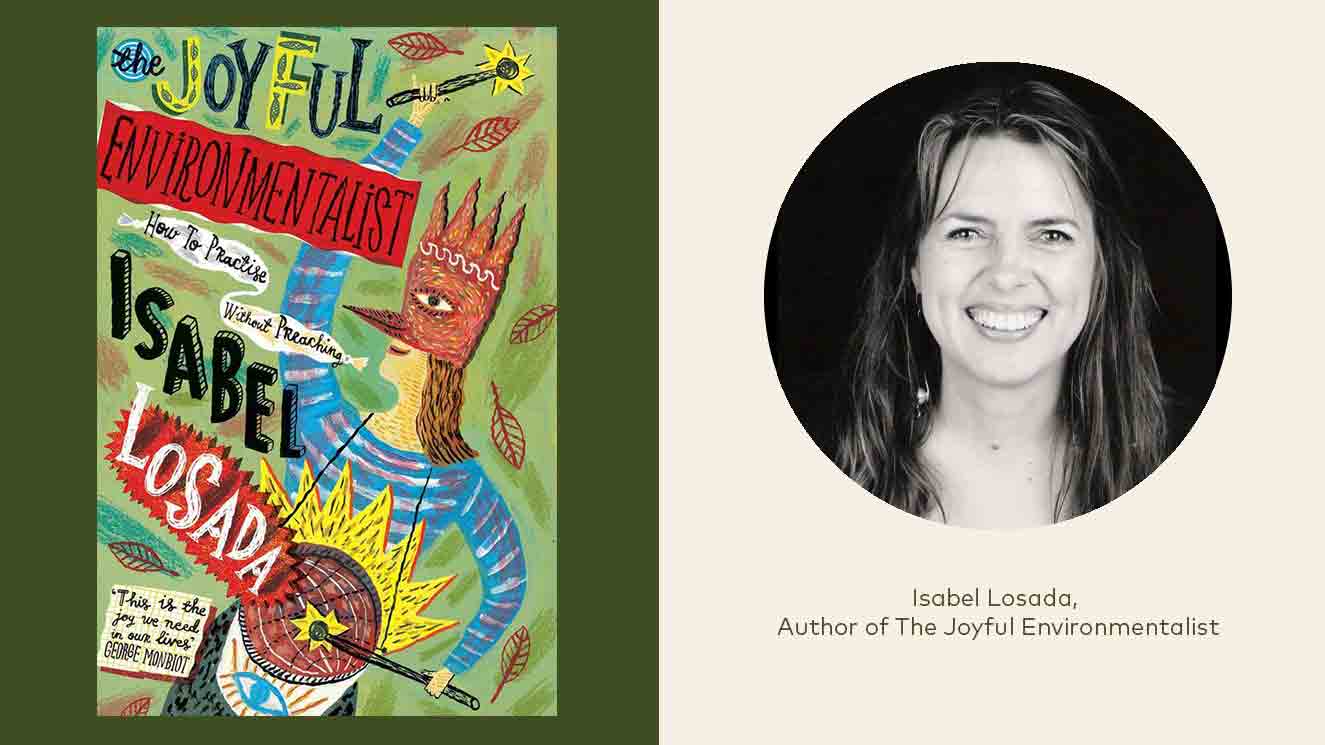Isabel Losada is a British author, journalist and public speaker who combines humour with a serious look at her subject matter. Isabel’s latest book the Joyful Environmentalist is a feel-good read for anyone who loves our planet and is looking for solutions. It’s fast, funny and inspiring, too. We had a conversation with Isabel to find out why and how we can all remain joyful amidst the climate crisis…
Q. Your book very deliberately avoids describing the climate crisis in detail, why is that?
Well, two reasons. Firstly, as an author, my focus has always been on happiness and living life to the full and looking at the positive and what works. Secondly, having read books about the environment myself for several years, I think the history of the problem the complexity of the problem, the international economic nature of the problem, the severity of the problem etc, have all been very well covered by other authors. And I like to think that we now know we have a problem. I prefer personally to go straight to solutions. That is my single minded focus.
Q. Joyful is not necessarily a word we would associate with this topic on the whole. So why did you choose The Joyful Environmentalist?
Looking at my previous work, as I say, my focus is on is on happiness. In one of my books, for example, I interview His Holiness the Dalai Lama, who says that purpose of life is happiness. And so I think it’s important also for the nature of the environmental cause that we find ways to combine what gives us joy and what makes us happy with saving our planet. And I don’t think that’s as difficult as it seems. Because I think there are many opportunities for creativity and duty within environmental work.
Q. In terms of activism, you can email your MP, and then at the other end of the scale, you can join a radical protest group. A lot of people feel that emailing their MP is probably worth doing but it’s probably not going to be instantly effective, and joining a protest group is maybe a step too far in the other direction for them. So what’s the middle ground in terms of activism?
Yes, I discussed this in the book because I’m exploring different forms of activism. And you may remember when I interview my friend who is a climate scientist, she says that the important thing is to be, and I love this phrase, a little bit activist. What I like about that phrase, being a little bit activist, is that it doesn’t sound overwhelming and daunting, like it’s going to exhaust you, but on the other hand, it sounds scarily persistent. And so I think your question is a very interesting one – where is the middle ground and I think that depends very much on what feels right. To each person and where they feel their passion lies.
I’m very much in favour of finding what you’re passionate about. For example, if your love is clothes, then it’s great to be activist within the fashion area. If your love is trees and protecting nature, then it’s important to be active in that area. The writer George Monbiot says it’s important to mobilise as well, by which he means it’s important not to feel that we’re doing things totally on our own. So if there is a small green space near you that your local council has decided yet again, to build a car park or a block of flats, It’s important that you find others that feel passionately about protecting it, and then find ways [to protect it] that work for you, that you’re going to enjoy, which is why in the in the book, I give the example of me playing in the samba band at Extinction Rebellion because drumming is just a wonderfully joyful thing.
And how the police even enjoy the drumming. I like that bit.
Everybody enjoys drumming! I mean, I have reservations myself about being arrested. But there are million ways out there and it depends. Again, it’s about following our passions, where we feel quite most closely connected with environmental movement, and it’s large enough that there’s something for everyone. Even the Royal Society for the Protection of Birds is becoming far more climate conscious and far more active. They’re always rallying their members who previously had just been people that enjoy looking at birds. Now they’re realising that they also need to protect the environment in which birds live. So even those most gentle people are being gradually walked to have a more activist position. All these organisations are really gearing up. I think there’s a lot of action.
Q. If we could touch on the word ‘joyful’ again for the moment, without wanting to be too depressing, many people will be feeling frustrated and disappointed, but not really surprised, by a fairly lukewarm outcome from COP26. How are you managing to stay joyful in the aftermath of that?
I think it’s very, very important as environmentalists, that we look at what we call our locus of control. In other words, where we have influence and where we don’t have influence. Of course we need to do everything we can to influence our politicians and our decision makers. That’s a part of the activism, but I’m persistently amazed at how many individuals that call themselves environmentalists haven’t taken what I consider to be immediate steps to put their own house in order.
For example, we need to not be banking with the high street banks, because the banks, if you ask them what they’re investing their money in, they tell you that it’s not in the public domain. So you can be sure if you’re with a high street bank, specifically Barclays who are notoriously the worst, you are actually supporting the fossil fuel industry. Where’s your money? If you join the Ethical Consumer, they will tell you the best in all these areas. Triodos Bank, for example, they’re the ones at the top of the ethical consumer list. They’re the most transparent. They’re very careful where they put their money.
So that’s one thing, and then there’s energy. We have environmentalists who literally have Shell as their energy provider – don’t do that! The most ethical energy providers, incidentally, are Green Energy, Good Energy and Ecotricity. If someone’s not with one of those, then you need to move to one of those.
There’s so much that we can do. I have met two friends in the last few days who walked into my house looking absolutely fantastic. And I said ‘Wow, that coat is amazing!’ One was beautiful, bright yellow, the other was a dark navy. Both of them had bought them from charity shops. And you know, they looked fantastic.
This is what I highlight in The Joyful Environmentalist, there’s so much that we can do. I think people feel depression when they feel up against a wall. But actually, there’s an enormous amount that we can do in every aspect of our lives. Making changes. I just had my energy proficiency test, looking at how we heat our houses, how we insulate our houses. There’s so much that we can do.
What are the three main changes that you’ve made in your life to be sustainable? I’m guessing that the banking and the energy are going to be in on that.
Yes. I get asked question a lot, what one thing can we do or what three things have you done? It’s really not like that, because it’s every single aspect of our lives. It’s what we wear. It’s what we eat. It’s how we travel. It’s how we how we dress. It’s how we where we buy our food. It’s how we buy our food. It’s how we spend our leisure time, you know it’s every single aspect. Over the last three years, there’s been gradual transformation in the way I see almost everything in my life. It’s not long ago, for example, that I would have been strolling into a shop at Christmas, buying my daughter a dress. Not even thinking about where it was made or who made it, or what it’s made of, or whether the dyes are natural or whether the cotton is organic, or whether it was made by a 12 year old in Thailand.
With every single item that we buy as consumers we’re very powerful, even if it’s just a coffee we’re buying. We have an opportunity to bring about change every single time we part with money. So I think it’s been more overall a transformation in the way I view my responsibility as what some people call an Earthling. As someone on the planet whose joyful job it is to look after the planet.
As I say in the in the book, most people can name twenty celebrities, but they can’t name ten trees. It’s amazing how disconnected we are from nature. And people boast about the fact that they can’t keep plants alive as if it’s a good thing. Even on the pot plants at home, we’re so out of touch with nature. It’s a very joyful evolution to find ways more and more ways to be in nature and to experience nature. As I’m talking to you. I’m sitting in the garden underneath two Japanese cherry trees. At the end of this interview, I’m going to spend the next hour sweeping the leaves. Finding ways to spend time in nature is not something that I think many people have had as a priority.
So rather than particular changes, you’re talking in a much more holistic way about a change in your approach to life.
Yes! But if the question is what three quick changes each person can reading this make, then obviously, leaving our high street bank, letting them know why you’re leaving them and going to the leading ethical bank in the country takes a day or less.
Changing our energy company is hugely important because [if we knew] the stuff that some of the energy companies get up to, most people would be mortified, but it’s not in the public domain. So again, we need to be with an energy company that’s genuinely committed to a sustainable future. That’s the second thing that we can all do this really quick and easy.
Buy food that is seasonal and organic and grown in the UK. Because it’s better for us and it tastes nice. Don’t buy it through a supermarket. Buy it as directly as you can from the farmers through farmers markets, or through one of the delivery companies.
Another one is to make a game of not shopping. Just don’t go shopping. Don’t buy clothes. They say that we wear 20% of our clothes 80% of the time. And we all have enough clothes apparently to last us for the next 10 years. How do we know this? Because you never ever see people walking the streets without clothes. We all have clothes. Learn about the creativity of mending and sharing clothes and all the creative things that people are doing with clothes apart from shopping. Just buy food. That’s all you need to buy. People always say ‘Oh, organic food is so expensive, you know?’ Yes, but you can afford it if you’re not buying anything else.
What I like about The Joyful Environmentalist is that it’s cheerful.
Yes, it’s cheerful. Let’s just be cheerful while we’ve still got this beautiful world, and do everything we can to look after it.




